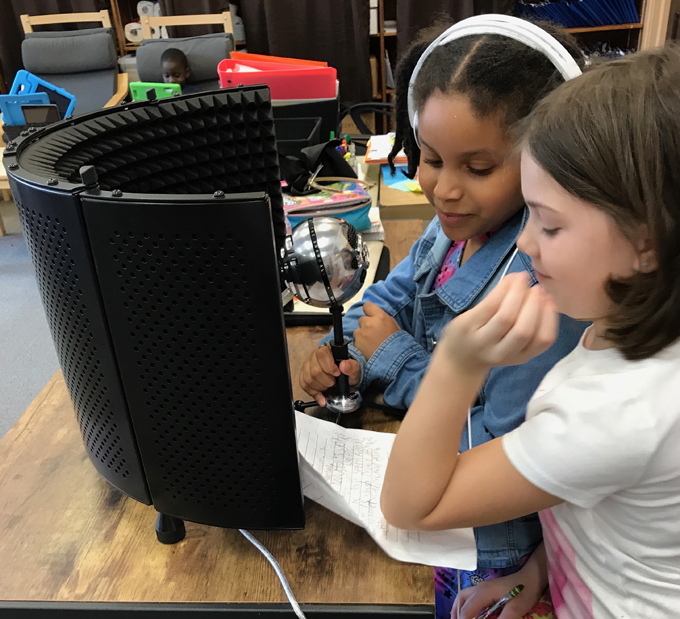 In the years since Hurricane Katrina made landfall along the Gulf Coast, education within the city of New Orleans has continued to shift. Immediately following the storm, many schools received technology donations, including interactive whiteboards and touch technologies, such as tablets. More recently, as charter schools continue to take hold in the city, educational and community leaders are seeking new ways to engage children and youth in literacies and community.
In the years since Hurricane Katrina made landfall along the Gulf Coast, education within the city of New Orleans has continued to shift. Immediately following the storm, many schools received technology donations, including interactive whiteboards and touch technologies, such as tablets. More recently, as charter schools continue to take hold in the city, educational and community leaders are seeking new ways to engage children and youth in literacies and community.
As a former early childhood educator in New Orleans, I have been privy to many of these original ideas on my return trips to visit family and friends. Yet, much of this important equity work remains peripheral to traditional conversations about school reform within the city. Given this, and because New Orleans will play host to the ILA 2019 Conference in October, I wish to highlight one group fostering new opportunities for children and youth to engage with/in their city.
Be Loud Studios (a newly formed nonprofit organization) exemplifies educational innovation by amplifying the voices of young people as they share ideas about—and happenings within—their communities. Under the lead of two seasoned educators—Diana Turner and Alex Owens—Be Loud Studios originated as a part of the larger curriculum at Bricolage Academy, an elementary school whose “overriding educational philosophy strives to develop students into creative problem solvers who will change the world.” Turner, a literacies interventionist, and Owens, the lead teacher in the school’s makerspace, wished to merge their expertise to give students, as Turner described, “a chance to talk about what’s going on in their communities.” Through their collaborative efforts and with support from school leader Josh Densen,BricoRadio—a weekly show dedicated to voicing the interests of Bricolage students— first aired in late January 2018.
Through the process of composing each episode, students engage in schooled notions of reading, writing, and making as they investigate and follow stories, write scripts, read and listen to their recordings, and make cuts to their final productions. Because show production requires print-based communication, Turner and Owens have had the chance to rehearse word-level skills such as phonics with targeted students. However, the teachers also use the opportunity to discuss the ideological nature of literacies, particularly when literacies are viewed as an autonomous skill set, by answering the question “Why do I have to learn this?” head-on. “With BricoRadio,” Turner argued, “we have a chance to make things like phonics relevant” by showcasing how print-based reading and writing can facilitate wider communication in new ways. Still, Turner and Owens are clear that BricoRadio should not only be perceived as an intervention for students who are seemingly “behind” based on standardized measures. Rather, these educators argue that, as Turner stated, “everyone can learn from being on the radio,” particularly because “kids have something to talk about.”
Now in its second season of production, Turner and Owens’ desire to center youth voices shines through in each episode. From the first segment to their newest release, the youth-run show reflects the students of Bricolage’s interests and curiosities in a meaningful way. For example, during the two seasons already produced, students have discussed their beloved New Orleans Saints and slime-making alongside the removal of local statues of Confederate leaders and the national Black Lives Matter movement. In this way, Turner and Owens offer students not only the opportunity to practice print-based and digital literacies but also open new avenues to examine social issues.
Following the great success Turner and Owens experienced with BricoRadio, the two teachers plan to extend their reach into other pockets of the community. “Kids want to do this,” Turner stated, “and they need to do it, too.” With the understanding that not all schools have the capacity or infrastructure to facilitate this kind of learning, the duo established Be Loud Studios to support children across formal and informal contexts in producing their own shows. Using the lessons learned as facilitators of BricoRadio, Turner and Owens hope to increase children and youth’s competency and proficiency as digital producers—not just consumers—throughout New Orleans. Together, the two plan to bring together different networks for the city’s young people to voice their concerns while improving access to digital literacies, beginning in July 2019, when they will launch a series of workshops through their youth summer camp.
Stay tuned to BricoRadio’s Instagram for new episodes from the students of Bricolage Academy and, if you’re attending the ILA conference this fall, be sure to listen to past episodes to get an insider’s perspective of the city!
Cassie J. Brownell is an assistant professor at the Ontario Institute for Studies in Education within the University of Toronto and the 2017 recipient of the ILA Helen M. Robinson Dissertation Grant. She has been a member of ILA since 2012.
This article is part of a series from the International Literacy Association Technology in Literacy Education Special Interest Group (TILE-SIG).